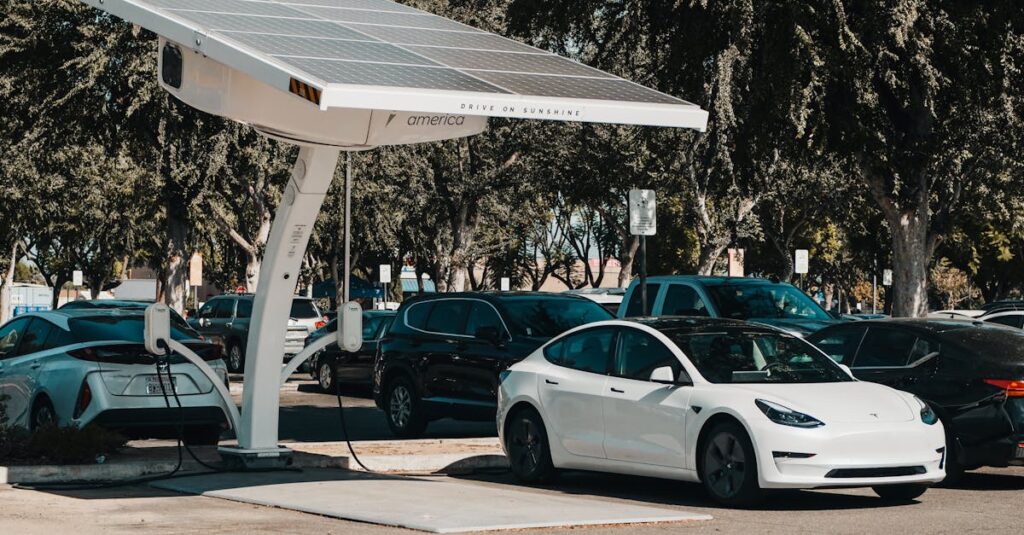As electric vehicles zoom into the mainstream, understanding their warranties can feel like deciphering hieroglyphics. Don’t worry, though—he’s got you covered. Warranties for EVs are more than just a safety net; they’re a roadmap to peace of mind in a world where range anxiety is real and charging stations can seem as elusive as a unicorn.
Table of Contents
ToggleUnderstanding Electric Vehicle Warranties
Electric vehicle warranties offer essential protection for owners, addressing concerns regarding performance and reliability. They vary significantly in terms of coverage and duration.
Types of Electric Vehicle Warranties
Three main types of warranties exist: the basic warranty, powertrain warranty, and battery warranty. The basic warranty typically covers most vehicle components, offering protection for 2 to 4 years or up to 50,000 miles. Powertrain warranties focus on critical components like the electric motor and drivetrain, lasting 5 to 10 years or 60,000 to 100,000 miles. Battery warranties are crucial for EV users, often covering battery defects for 8 years or 100,000 miles, ensuring replacement or repair for faulty batteries.
Key Components of Electric Vehicle Warranties
Several key components define electric vehicle warranties. Coverage details specify what parts or systems are included, impacting overall vehicle maintenance costs. Exclusions clarify which components aren’t covered, such as wear and tear items. Transferability allows owners to transfer the warranty to future buyers, increasing the vehicle’s resale value. Roadside assistance may be included, providing services for emergencies like breakdowns or low battery situations. Understanding these components helps consumers make informed decisions about their electric vehicle investments.
Coverage Offered in Electric Vehicle Warranties
Electric vehicle warranties provide essential protection for various vehicle components. Understanding the specifics of coverage helps consumers make informed decisions.
Battery Coverage
Battery coverage stands as a critical component of electric vehicle warranties. Many manufacturers offer extensive battery warranties, typically covering defects for 8 years or up to 100,000 miles. This warranty often includes specific provisions for deterioration, addressing issues that may arise over time. Coverage usually encompasses repairs or replacements needed due to manufacturing defects. It’s important for owners to review the terms, as some warranties differ in mileage limits and coverage scope among brands.
Comprehensive Coverage vs. Powertrain Coverage
Comprehensive coverage includes various components beyond just the powertrain. It generally covers repairs for most vehicle parts, ranging from electrical systems to interior features. Powertrain coverage, however, focuses exclusively on key components like the transmission and electric motor. Typically, manufacturers provide powertrain warranties for 5 to 10 years or 60,000 to 100,000 miles. Consumers should evaluate their needs, considering the type of use and total vehicle lifespan when choosing between comprehensive and powertrain warranties.
Factors Affecting Electric Vehicle Warranties
Several factors influence the extent and quality of electric vehicle warranties. Understanding these elements helps consumers make informed decisions regarding their vehicle investments.
Manufacturer’s Warranty Policies
Manufacturers establish warranty policies that can vary significantly among different brands and models. Coverage typically reflects the manufacturer’s confidence in their product and can range from comprehensive to basic plans. Models that receive high-quality ratings often come with extended warranties. Specific components, like the battery and powertrain, may have longer protection periods. It’s essential for consumers to read the warranty terms and conditions, as they outline critical details like coverage limits and exclusions. Additional features, such as roadside assistance, may also vary, enhancing or limiting the warranty’s value.
Third-Party Warranty Options
Third-party warranties can complement manufacturer offerings but come with diverse coverage levels and costs. Consumers often explore these options for broader coverage or to extend protection beyond the manufacturer’s terms. Different companies provide various plans, covering everything from electrical systems to major components that manufacturers may not encompass. These warranties typically require careful evaluation, as terms, conditions, and premiums vary widely. It’s advisable to compare several third-party providers, understanding the claims process and any potential restrictions. Always examine customer reviews and financial strength of the warranty provider while considering the benefits of additional protection.
Common Misconceptions About Electric Vehicle Warranties
Misunderstandings about electric vehicle warranties often lead to confusion. Consumers frequently mix up facts and myths regarding their coverage.
Myths vs. Facts
One common myth suggests that electric vehicle warranties are shorter than traditional vehicle warranties. In reality, many EV models offer warranties comparable to those of gasoline vehicles. Another misconception is that battery warranties cover all possible issues. Battery warranties typically cover manufacturing defects and may exclude normal wear and tear or environmental damage. People often believe that warranties automatically transfer to new owners. However, not all warranties are transferable, making it crucial to verify this before purchasing a used EV.
Importance of Reading the Fine Print
Examining the fine print reveals essential details about warranty coverage. Exclusions often lurk within warranty documents, affecting repairs and replacements. Coverage limits can vary significantly, influencing potential out-of-pocket costs. Some consumers overlook the implications of warranty transferability. Understanding how warranties transfer helps buyers make informed decisions. Roadside assistance options may also vary, impacting overall vehicle support. Written terms often dictate specific procedures for making claims, so knowing these processes ensures smoother resolutions.
Electric vehicle warranties play a crucial role in enhancing consumer confidence in their investment. By understanding the various types of warranties and their specific coverage, owners can better navigate the complexities of EV ownership. Knowledge of key components like battery and powertrain warranties helps consumers assess their needs effectively.
With the right warranty in place, drivers can enjoy the benefits of electric vehicles without worrying about unexpected costs. Evaluating manufacturer offerings alongside third-party options can lead to optimal protection. Ultimately, informed decisions about warranties can ensure a smoother and more enjoyable driving experience for electric vehicle owners.





